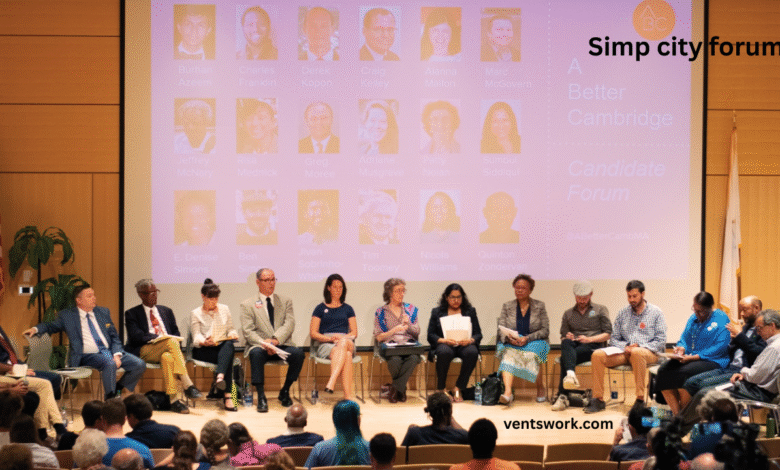Inside Simp City Forum: Digital Desire, Drama, and Discussions

The word “simp city forum” began as an internet insult but quickly evolved into a complex cultural phenomenon. Originally used to mock people who seemed overly submissive or infatuated with someone online, the term has been reclaimed in various online circles. Simping now encompasses a wide range of behaviors, from harmless admiration to obsessive online stalking. As the digital world continues to blur the lines between public and private lives, entire communities have emerged that revolve around this concept. Among these, Simp City Forum became a defining platform.
Simp City Forum capitalized on the rise of platforms like OnlyFans, TikTok, and Instagram, where influencers monetize attention. It offered a space where users could discuss, admire, critique, or even leak content related to online creators. This made it controversial from the outset. Whether you’re curious about the forum’s role in internet culture or exploring the implications of such digital communities, Simp City is more than just a name—it’s a mirror reflecting the modern landscape of internet obsession and voyeurism.
This article explores the origins, functionality, community dynamics, and impact of Simp City Forum, shedding light on the ethical and legal concerns it raised along the way. As the online world continues to grapple with privacy, consent, and digital economies, understanding such spaces becomes crucial.
Origins and Background of Simp City Forum
Simp City Forum emerged in the early 2020s, a time when digital fan culture was exploding. Although the exact founder remains anonymous, its initial purpose was clear: create a centralized hub for sharing and discussing adult content—especially content taken from paid platforms. Initially a fringe corner of the internet, the forum quickly gained traction as users shared leaked content and developed a bustling community around it.
The forum grew rapidly through word of mouth, Reddit threads, and backlinks from similar forums. Many users were drawn in by the promise of free access to premium content, while others came for the community atmosphere and gossip surrounding influencers. As the user base expanded, Simp City evolved from a simple sharing board into a full-fledged ecosystem with different sections, moderators, and ranks.
This growth was both its strength and downfall. Increased visibility meant increased scrutiny from creators, platforms, and even legal authorities. It began facing DMCA takedown requests and server issues. Nonetheless, Simp City Forum set a precedent for future NSFW (Not Safe For Work) digital communities.
Key Features and Forum Structure

At its peak, Simp City Forum was highly organized and user-friendly, despite the morally ambiguous nature of its content. It was divided into sections such as “OnlyFans Leaks,” “Instagram Models,” “Requests,” and “General Discussion.” Each section had thousands of posts, often including images, video clips, and download links.
The forum operated using a traditional online board structure. Users could create accounts to post, comment, and interact. A ranking system rewarded active members with badges and privileges. While registration was free, some sections required a certain number of posts or a paid upgrade to access. The forum also encouraged anonymity, allowing users to create burner accounts without email verification.
Moderation varied. While there were rules against child exploitation and extreme content, enforcement was inconsistent. Some sections had moderators who actively deleted reported content, while others resembled a digital Wild West. Still, the reputation system, where users could “vouch” for others, provided a semi-reliable measure of trust within transactions or shared content.
These features helped Simp City Forum stand out in a crowded space, creating a user experience that was both engaging and dangerously addictive.
Legal and Ethical Concerns
Simp City Forum operated in murky legal waters. Much of the content shared was copyrighted, often pirated from platforms like OnlyFans or Patreon without the creator’s consent. While users justified these actions under the guise of “freedom of information,” it clearly breached intellectual property laws.
Content creators began pushing back, filing DMCA complaints and enlisting legal help to have their content removed. Some creators even used watermarks or trackable images to catch leakers. Still, due to the anonymous nature of the forum and its hosting on offshore servers, enforcement was difficult. The legality varied depending on the country, but the ethical implications were universally concerning.
From an ethical standpoint, Simp City encouraged parasocial relationships—where users felt an imaginary intimacy with content creators. This dynamic simp city forum fed into entitlement and exploitation, blurring the lines between admiration and harassment. While some users claimed they were simply fans, their actions—such as sharing private, paid content without consent—told another story.
The forum also posed risks to users. Engaging with illegal or pirated content could lead to malware, phishing attacks, or legal repercussions, especially for those who actively distributed such material. It highlighted the need for better digital literacy and accountability.
Community Dynamics and Culture
The community on Simp City was diverse but often toxic. Some users were genuine fans, others were trolls, and a significant number were opportunists sharing stolen content for clout or crypto payments. A complex hierarchy existed, with veteran users holding sway through reputation points and content contributions.
Slang and memes were integral to the culture. Terms like “leak god,” “simp tax,” and “mega drop” became common. Users bragged about “simp city forum” while mocking others for “begging” or not contributing. This created a competitive atmosphere where being first to leak content gained recognition.
Despite the toxic elements, some found a sense of belonging. Forums allowed open discussions about online influencers, adult content, and internet trends—topics often stigmatized elsewhere. However, this sense of community often came at the cost of privacy and respect for the individuals discussed.
Conflicts and flame wars were frequent. Disputes over fake content, scams, or personal attacks often spiraled into cyberbullying or doxxing. Without strong moderation, the forum became a breeding ground for internet drama, which ironically contributed to its allure.
Conclusion: More Than Just a Forum
Simp City Forum was more than just a space to share leaked content—it was a digital microcosm reflecting modern internet culture’s obsessions, flaws, and ethical dilemmas. Its rise highlighted the complexities of fan behavior, the allure of anonymity, and the dark side of content consumption.
Though its legal status remains dubious and its moral footprint questionable, Simp City leaves behind valuable lessons. It shows the importance of digital responsibility, respecting creator rights, and the dangers of unregulated platforms. As the internet continues to evolve, so will the methods and ethics surrounding online content sharing.
The forum’s eventual decline serves as a cautionary tale for both users and platforms. In a world where digital footprints are permanent and simp city forum content has real-world value, communities like Simp City may always exist—but they also risk imploding under the weight of their own contradictions.
FAQs
What is Simp City Forum?
Simp City Forum was an online platform known for sharing adult content, particularly leaked material from platforms like OnlyFans.
Is Simp City Forum legal?
Much of its content violated copyright laws, making its legality questionable and subject to takedowns.
Can I still access Simp City Forum?
As of now, it has faced multiple shutdowns. Any live versions are likely under different domains or mirrors.
Is Simp City safe to use?
No. Users risk encountering malware, scams, and potential legal consequences.
Why did Simp City gain popularity?
It offered free access to premium content and became a hub for voyeuristic internet culture.
What’s the ethical issue with Simp City?
It encouraged content theft, violated creators’ privacy, and promoted toxic parasocial dynamics.
You May Also Read: https://ventswork.com/rub-ranking/



